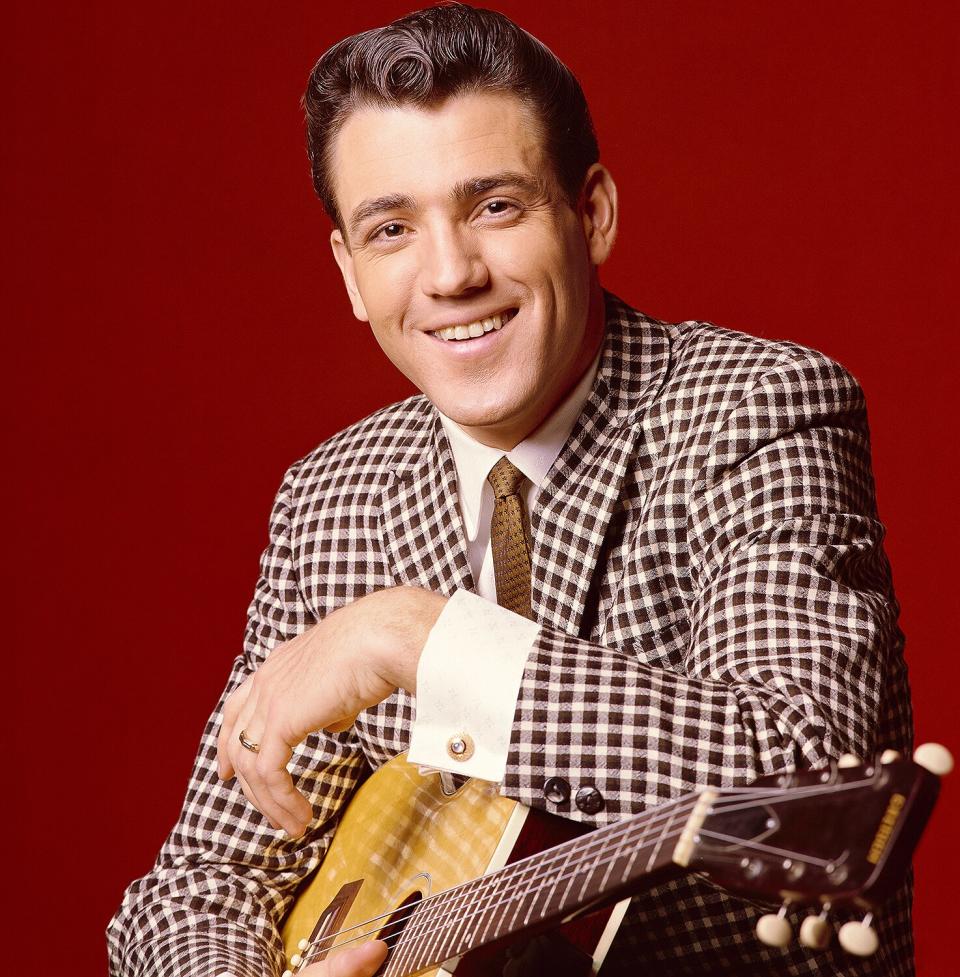Jimmie Rodgers, 'Kisses Sweeter Than Wine' Singer, Dead of Kidney Disease at 87

Michael Levin/Corbis via Getty Jimmie Rodgers
Legendary pop singer Jimmie Rodgers (né James Charles Rodgers) has died. He was 87.
The star died from kidney disease on Jan. 18 and had previously tested positive for COVID-19, PEOPLE confirms. He died in his Palm Desert, California residence.
Born in Washington state on Sept. 8, 1933, he first gained popularity in the '50s and '60s after releasing Billboard hits including "Kisses Sweeter Than Wine" and his rendition of mega-hit song "Honeycomb." Rodgers first developed an interest in music as a young child after he learned from his mom, a piano teacher. He sang in church and taught himself to play the guitar.
During his time in the U.S. Air Force amid the Korean War, Rodgers was transferred to Nashville upon his return to the states, where he was stationed at Seward Air Force Base from 1954 to 1956. In Nashville, he began singing at local venues for $10 per night and competed on Arthur Godfrey's CBS talent show and won $700, a hefty sum at the time. He was signed with Roulette Records soon after and recorded his own version of "Honeycomb" in 1957. Written by Bob Merrill and originally recorded by Georgie Shaw, the track became Rodgers' biggest hit — having charted for four weeks. It sold more than one million copies and went gold with the RIAA.
The singer continued releasing fan-favorite tracks including "Oh-Oh, I'm Falling in Love Again," "Secretly" and "Are You Really Mine?" in the years to come.

Michael Ochs Archives/Getty Jimmi Rodgers
RELATED: Remembering the Stars We've Lost in 2020
Rodgers' unique music style landed him spots on Billboard's pop singles, hot country and western sides and hot rhythm and blues sides charts. He received his first songwriting credits as Jimmie F. Rodgers (to differentiate himself from another singer with the same first and last name). The star appeared in films including The Little Shepherd of Kingdom Come and Back Door to Hell. His music earned him several TV performances on variety shows including Shower of Stars with Jack Benny, The Big Record with Patti Page, the Ed Sullivan show and The Smothers Brothers Comedy Hour.
In 1958, he was the star of The Jimmie Rodgers Show on NBC. But things took a turn in 1967, when he was found inside of his car on a Los Angeles highway with severe injuries to his head and more.
To date, it is still unclear what happened to the star. "I rolled the window down to ask what was the matter [and] that's the last thing I remember, " he told the Toronto Star two decades later in 1987, per the AP. A source close to Rodgers tells PEOPLE the musician was beaten by a man who turned out to be an off-duty police officer. "Two other policemen soon arrived, picked him up and left him in his car unconscious, but fortunately his conductor had been following and found him," adds the source.
In 1973, Rodgers agreed to accept a $200,000 settlement from the LAPD. The three policemen involved in the incident were suspended for two weeks for leaving him in his car, according the source. Many speculated that the attack was organized as retaliation after he left his former record label.
The injuries he sustained led him to develop Spasmodic Dysphonia, a condition which caused spasms in his voice box muscles. He also began suffering occasional seizures while performing. Rodgers underwent multiple operations, including brain surgery, to recover.
In 1969, Rodgers made his big TV return with his own summer variety on ABC. With much success, his music continued to reign on the Billboard Country and Easy Listening charts until '79, with some of his popular songs were featured in commercials.
Most recently in 2016, Rodgers revealed the moment he realized he wanted to pursue music for the rest of his life. "We were sitting on the floor with only candles for light, and these tough soldiers had tears running down their cheeks," he told Utah newspaper The Spectrum of his time in the the military. "I realized if my music could have that effect, that's what I wanted to do with my life.
Rodgers is survived by his wife Mary Louise Biggerstaff, whom he wed in 1978 and his children Michele and Michael from his first marriage, sons Casey and Logan from his second marriage and a daughter Katrine Rodgers, whom he shares with Mary. He is also survived by five grandchildren and two great-grandchildren.

 Yahoo Finance
Yahoo Finance 